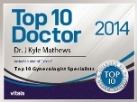Women who have mixed urinary incontinence experience the symptoms of both stress urinary incontinence and urge incontinence
Many women have a type of incontinence known as mixed urinary incontinence, which means they experience both stress urinary incontinence (SUI) and urge incontinence, also known as overactive bladder or OAB. This diagnosis can be missed or misinterpreted by physicians who are not experienced in the diagnosis of incontinence, but women who come to our North Dallas urogynecology office can rest assured that Dr. J. Kyle Mathews has the training and expertise to diagnose and treat this condition.
The symptoms of both stress urinary incontinence and urge incontinence affect women with mixed urinary incontinence
In most cases, a woman with mixed urinary incontinence will have more symptoms of one type of incontinence than the other, but she will experience problems associated with both types—stress urinary incontinence and urge incontinence.
- Symptoms of stress incontinence include: urine leakage when laughing, sneezing, performing heavy lifting or exercising. If the symptoms are more severe, leakage can occur when doing something as simple as walking or standing.
- Urge incontinence symptoms are: feeling the sudden urge to urinate, urinating frequently, waking up at night to urinate or urine leakage when the urge to go occurs.
Diagnosis is the first step toward finding relief
When you come to our North Dallas urogynecology office to discuss your problem, we will begin by taking your medical history and performing a physical examination. We may culture a urine sample. Keeping a bladder diary at home is helpful because it records how often you urinate, whether or not you experience leakage and other important facts that will help us decide whether you have mixed urinary incontinence or some other type.
After we take these steps, we may discuss further testing with you, such as pelvic floor assessment, a postvoid residual assessment, or urodynamic testing. We have many tools at our North Dallas urogynecology office to help us make an accurate and thorough diagnosis.
Treatment options aren’t always surgical
Dr. Mathews usually begins by treating patients with non-surgical treatments for incontinence, such as lifestyle modifications, changes in diet, behavioral modifications or bladder retraining. We may also discuss medications with you, as well as minimally invasive treatments for incontinence, and if necessary, surgical treatments. Our goal is to improve your quality of life.
Don’t ignore the symptoms of mixed urinary incontinence—visit our North Dallas urogynecology office for expert care
Sometimes women assume that the symptoms of mixed urinary incontinence are part of aging. They just accept them as part of life, even though it makes them uncomfortable. We urge you to get help—contact us for an appointment at our North Dallas urogynecology office today.











